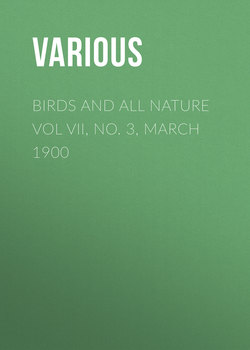Читать книгу Birds and all Nature Vol VII, No. 3, March 1900 - Various - Страница 8
ANIMAL PETS IN SCHOOL
ОглавлениеA WISE old man down in Boston says animal pets should be kept in public schools to teach children kindness to the weak. The jokesters are already at work deriding one of the best thoughts anybody has had about education for a long time because it seems, and possibly is, impracticable. They call it a reversal of the Mary's lamb doctrine, and suggest the propriety of letting the children throw paper wads to teach them accuracy and precision.
Despite both its doubtful practicability and the jester's little fling, Dr. Edward Everett Hale's proposition is not only founded on a right theory, but reflects the very way in which nature, says the Chicago Journal, first taught the great lesson of altruism and love.
Most of our scientists and some of our religious teachers nowadays believe that man ascended from the beasts. If he did, the first kindness, the first unselfishness, the first compassion for the helpless, and gentleness toward the weak, that were ever in the world, the first things that ever differentiated man from brute, were taught to the parents of the race in exactly the way Dr. Hale would have them taught to its children.
There never was any human love until there was human helplessness. There never was any mother-love or father-love until children began to be born that were feeble.
In some of the lower orders of life the young can take care of themselves as soon as they are born. There is no reason why anything should "care for" them, so nothing does. There is no affection for them nor from them nor among them.
Love was first excited by something that needed care and kindness. A couple of shaggy savages, animals that didn't know enough to love each other yet, felt something "akin to pity" for an ugly baby with a gorilla chin and no forehead, and resolved to do something not for themselves, but for the hideous infant, and not because they were proud of its prettiness and wanted to keep it for a plaything, but because it so obviously needed to have something done for it.
That, the scientists tell us, was the beginning of unselfishness, the beginning of care for others, the origin of affection and altruism, the genesis of humanity, the promise of the destiny of man. The baby was the animal pet that got into the schoolhouse with the children of the early world and taught the first lesson of love. On its mighty weakness hung most of those powerful and wonderful forces that have lifted brutehood into manhood.
Heredity does a great deal, but most of the lesson has to be taught over to every individual, and it is a more important one than geography or grammar. Humanity's happiness and further progress depend on the thoroughness with which it learns the lesson, not of arithmetic or spelling, but of altruism.
Children are cruel. But they have hereditary instincts of kindness for the weak that would develop the sooner into love for their fellows if they had something helpless to exercise them on. When a big, hulking, selfish boy begins to take a protecting interest in a little yellow dog he is unconsciously teaching himself the greatest lesson he can ever learn. Trotting around in that woolly hide, dodging stones, fleeing to him for protection from the poundman, getting lost, and kicked, starved, and hurt, is the beginning of the boy's unselfishness and the man's altruism, and it is not funny, but sad, that the schoolhouse door must shut it out so that the reluctant master may the better give his attention to the mysteries of commercial arithmetic and the art of skinning his fellow-man by means of "brokerage," "discount," and "compound interest."
Dr. Hale may never see animal pets in the schools, but he has been in the world a long time, and knows what humanity needs.
